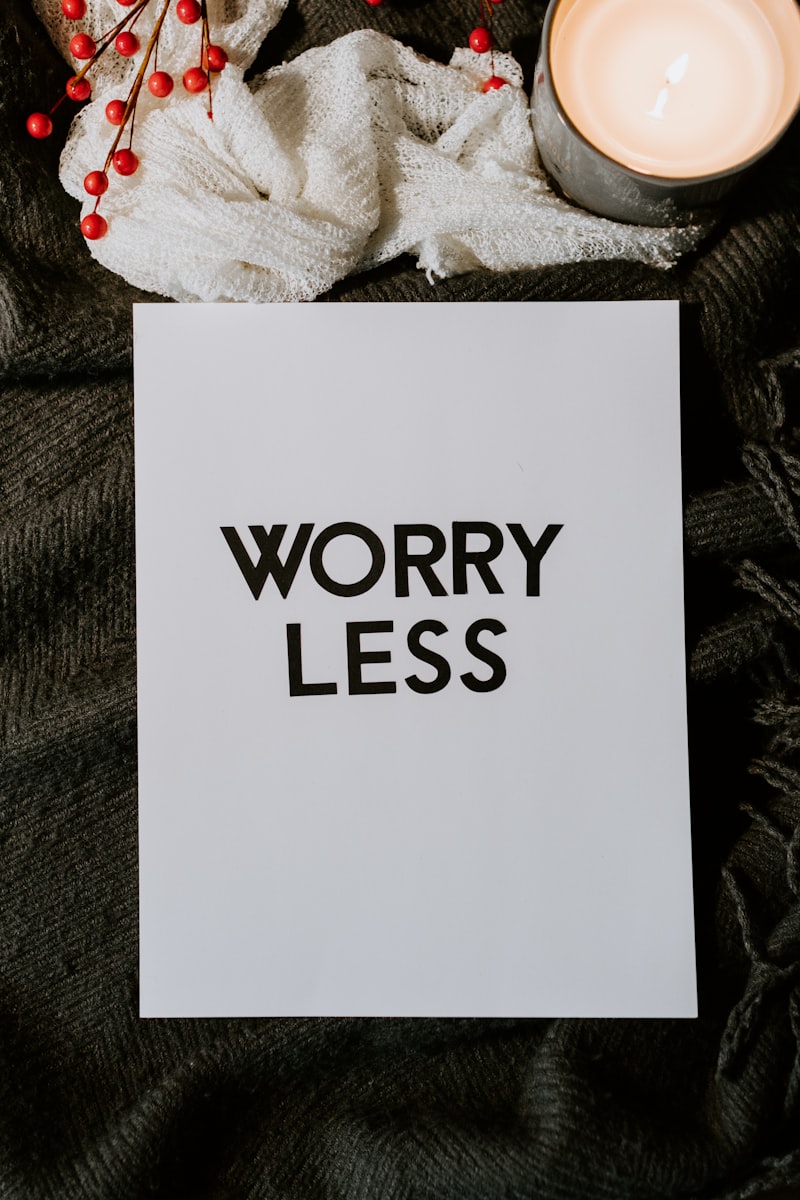Feeling overwhelmed by stress is a common experience in today’s fast-paced world. To maintain a healthy balance, mastering effective stress management techniques is crucial. Let’s explore some practical strategies to help you regain control and foster a sense of calm amidst life’s pressures.
Firstly, mindfulness and meditation are powerful tools. Taking a few minutes each day to center yourself, focus on your breath, and observe your thoughts without judgment can significantly reduce stress levels. It’s like giving your mind a refreshing break, allowing you to approach challenges with renewed clarity.
Physical activity is another potent stress-buster. Whether it’s a brisk walk, yoga session, or hitting the gym, exercise releases endorphins, the body’s natural mood elevators. This not only relieves tension but also enhances your overall sense of well-being.
Maintaining a balanced diet plays a crucial role in managing stress. Avoiding excessive caffeine, sugar, and processed foods can stabilize energy levels and mood swings. Instead, opt for nutritious meals rich in fruits, vegetables, and whole grains, which provide sustained energy and support optimal brain function.


Finding time for hobbies and relaxation is essential amidst hectic schedules. Engaging in activities you enjoy—be it reading, painting, or gardening—provides a welcome distraction and promotes a sense of fulfillment beyond daily responsibilities.

Effective time management is key to reducing stress triggers. Prioritizing tasks, setting realistic goals, and learning to delegate when possible can prevent feeling overwhelmed. Breaking tasks into smaller, manageable steps makes daunting projects more approachable and less stressful.
Lastly, fostering a strong support network is invaluable. Connecting with friends, family, or support groups offers emotional reassurance and practical advice during challenging times.
By incorporating these effective stress management techniques into your daily routine, you empower yourself to navigate life’s demands with resilience and positivity.
Mastering Mindfulness: Key Techniques for Stress Relief

In today’s fast-paced world, stress seems to be an inevitable part of life. From deadlines at work to personal commitments, it’s easy to feel overwhelmed. However, mastering mindfulness can be a game-changer when it comes to managing stress effectively.
Mindfulness is more than just a buzzword; it’s a powerful practice rooted in ancient traditions that has gained significant traction in modern psychology. At its core, mindfulness involves being fully present in the moment, without judgment. It allows you to observe your thoughts and feelings from a distance, which can help prevent getting caught up in negative thinking patterns that contribute to stress.
One of the key techniques in mindfulness is mindful breathing. This involves taking slow, deep breaths, paying attention to the sensation of each inhale and exhale. It sounds simple, but this practice can quickly calm your nervous system and bring you back to the present moment when stress starts to creep in.
Another effective technique is body scan meditation. This involves mentally scanning your body from head to toe, noticing any areas of tension or discomfort. By bringing awareness to these sensations, you can release physical tension and promote relaxation.
Mindfulness isn’t just about meditation; it’s also about integrating awareness into everyday activities. For example, when you’re eating, instead of rushing through your meal, take the time to savor each bite, noticing the flavors and textures. This mindful eating practice not only enhances your enjoyment of food but also helps regulate your appetite and digestion.
When it comes to stressful situations, mindfulness teaches you to respond rather than react impulsively. By pausing and observing your thoughts and emotions, you can choose a more thoughtful and calm response, rather than being swept away by stress-induced reactions.
From Chaos to Calm: Proven Strategies for Stress Management
One of the most effective tools in your stress-busting arsenal is mindfulness. This practice involves staying present in the moment, acknowledging your thoughts and feelings without judgment. By cultivating mindfulness, you can observe stressors without becoming overwhelmed by them, fostering a sense of inner peace and clarity.
Physical activity is another powerful antidote to stress. Engaging in regular exercise not only boosts your physical health but also releases endorphins—natural mood lifters that combat stress hormones. Whether it’s a brisk walk in the park, a yoga session, or hitting the gym, finding a physical activity you enjoy can significantly reduce stress levels.
In the quest for calm, don’t underestimate the importance of a healthy lifestyle. Eating a balanced diet, rich in whole foods and nutrients, provides your body with the fuel it needs to cope with stress. Adequate sleep is equally crucial; it allows your mind and body to recharge, enhancing resilience against daily pressures.
Seeking social support is another key strategy. Connecting with friends, family, or a support group can provide a valuable outlet for expressing emotions and gaining perspective. Sharing your experiences with others can lighten your mental load and offer fresh insights into managing stress effectively.
Lastly, incorporating relaxation techniques into your daily routine can work wonders. Whether it’s deep breathing exercises, meditation, or indulging in a favorite hobby, carving out time for relaxation promotes a sense of calm amidst life’s chaos.
By implementing these proven strategies—mindfulness, physical activity, a healthy lifestyle, social support, and relaxation—you can navigate the challenges of stress with resilience and grace.
Inside Out: Holistic Approaches to Reducing Stress
Holistic approaches emphasize a comprehensive view of health, addressing the interconnectedness of physical, emotional, and mental aspects. Rather than treating symptoms in isolation, these methods aim to harmonize the entire system. Techniques such as mindfulness meditation, yoga, and acupuncture are central to holistic stress reduction. They not only alleviate physical tension but also promote mental clarity and emotional balance.
Mindfulness meditation, for instance, encourages deep relaxation through focused attention on the present moment. By observing thoughts and sensations without judgment, individuals can cultivate a greater sense of inner peace and resilience against stressors. Similarly, yoga combines physical postures with breathing exercises to release tension stored in the body and calm the mind. Its holistic nature enhances flexibility, strength, and emotional stability.
Acupuncture, an ancient Chinese therapy, involves inserting thin needles into specific points on the body to restore balance in the flow of energy or Qi. This practice is believed to alleviate stress by promoting relaxation and improving circulation, thereby enhancing overall well-being.
In addition to these practices, holistic approaches to stress reduction often incorporate dietary adjustments and lifestyle changes. Consuming nutrient-rich foods, staying hydrated, and getting regular exercise are fundamental to supporting physical health, which in turn can bolster resilience to stress.
Ultimately, holistic approaches offer a personalized path to stress reduction, acknowledging that each individual’s experience of stress is unique. By integrating these methods into daily life, one can cultivate a more balanced and harmonious existence, where stress no longer holds sway over overall well-being.
The Science of Serenity: Evidence-Based Stress Relief Methods

Imagine a world where stress melts away like snow under the warm sun. In today’s fast-paced life, finding moments of serenity can feel like chasing a fleeting dream. But fear not, because science has uncovered some incredible evidence-based methods to tame the tumultuous waves of stress.
Have you ever wondered why a walk in the park feels so calming? It’s not just the fresh air—it’s the power of nature to heal our minds. Studies show that spending time outdoors, surrounded by greenery, can significantly lower cortisol levels, the infamous stress hormone. It’s like a natural reset button for your brain, washing away worries with every rustle of leaves and chirp of birds.
But what about those moments when stress hits hard, and you need relief pronto? Enter mindfulness meditation, a practice steeped in ancient wisdom and backed by modern science. By focusing your attention on the present moment without judgment, mindfulness rewires your brain to respond more calmly to life’s challenges. It’s not about eliminating stress altogether but rather about building resilience from within, like a sturdy house that withstands the storm.
And let’s not forget the power of a good laugh. Ever noticed how laughter is contagious? It’s not just a saying—laughter releases endorphins, those feel-good chemicals that act as natural stress busters. Whether it’s a hilarious sitcom or sharing jokes with friends, laughter is medicine for the soul, lightening the burden of stress one chuckle at a time.
Now, what if you could combine these methods into a stress-relief powerhouse? Picture yourself strolling through a tranquil park, practicing mindfulness as you soak in the sights and sounds of nature. Suddenly, a burst of laughter erupts from a nearby group, and you can’t help but join in. In that moment, stress doesn’t stand a chance against the harmony of nature, mindfulness, and laughter working in tandem.
The science of serenity isn’t just a concept—it’s a collection of powerful tools at your disposal. From the calming embrace of nature to the transformative practice of mindfulness and the infectious joy of laughter, these evidence-based methods offer a path to serenity amidst life’s chaos. So, why wait? Embrace these techniques and discover the art of living stress-free, one peaceful moment at a time.
Unlocking Inner Peace: Effective Stress Management Techniques
One of the fundamental pillars of managing stress is mindfulness. It’s about being fully present in the moment, acknowledging your thoughts and feelings without judgment. Picture this: you’re sitting by a tranquil lake, watching the ripples on the water. Your mind clears, focusing only on the gentle movement before you. This is mindfulness in action – a simple yet profound way to quiet the noise within.
Another effective technique is deep breathing exercises. Imagine stress as a heavy weight on your chest. Now, take a slow, deep breath in, filling your lungs completely. Hold it for a moment, then exhale slowly, releasing that weight with each breath. Repeat this several times, feeling yourself become lighter and more relaxed with every breath.
Physical activity is not only great for your body but also for your mind. Engaging in regular exercise releases endorphins – those feel-good hormones that can lift your spirits and reduce stress levels. Whether it’s a brisk walk in nature, a yoga session, or a dance class, find an activity that brings you joy and makes you feel alive.
Journaling is another powerful tool for managing stress. Imagine your mind as a cluttered room. Now, take a pen and paper and start writing down your thoughts, worries, and emotions. As you put words to paper, you begin to untangle the mess in your mind, gaining clarity and perspective along the way.
Lastly, don’t underestimate the importance of connecting with others. Humans are social beings, and having a strong support network can be invaluable during stressful times. Whether it’s sharing a laugh with a friend, seeking advice from a loved one, or simply knowing you’re not alone in your journey – these connections can provide comfort and strength.
Beyond Deep Breaths: Advanced Strategies for Stress Control
Have you ever considered the power of reframing your thoughts? It’s more than just positive thinking; it’s about consciously changing how you perceive and respond to stressful situations. Imagine a stressful work deadline not as a looming threat but as an opportunity to showcase your skills under pressure. This shift in perspective can turn stress into a catalyst for growth.
Another potent strategy is mindfulness meditation. It’s not merely about sitting quietly; it’s training your mind to observe thoughts and sensations without judgment. This practice enhances emotional resilience, allowing you to navigate stress with greater ease. Picture it like strengthening a muscle—you become better equipped to face life’s challenges head-on.
Physical exercise is a powerhouse against stress too. Beyond its obvious health benefits, exercise releases endorphins that boost mood and reduce stress hormones like cortisol. Whether it’s a brisk walk in nature or a high-energy workout session, moving your body can be a transformative stress-relief tool.
Let’s talk about the art of setting boundaries. Saying ‘no’ when needed isn’t selfish—it’s self-care. Establishing clear boundaries helps manage workload and expectations, preventing overwhelm and burnout. Think of it as drawing a line that protects your well-being while allowing you to focus on what truly matters.
Lastly, consider the impact of a supportive social network. Connecting with others fosters a sense of belonging and provides valuable emotional support during stressful times. Sharing your feelings and experiences can lighten the load and offer fresh perspectives.
Frequently Asked Questions
How can mindfulness practices help in managing stress?
Learn how mindfulness practices can effectively manage stress by cultivating present-moment awareness and reducing anxiety through focused breathing and meditation techniques.
What are the best daily habits for reducing stress?
Discover effective daily habits that can help reduce stress levels. Implement practices like mindfulness meditation, regular exercise, maintaining a balanced diet, ensuring adequate sleep, practicing deep breathing exercises, and setting aside time for hobbies or relaxation activities.
What are practical strategies for handling workplace stress?
Discover effective strategies to manage workplace stress with practical tips that promote well-being and productivity. Learn how to prioritize tasks, set boundaries, practice mindfulness, and foster a supportive work environment.
What are effective stress-relief exercises?
Discover effective stress-relief exercises that can help calm your mind and body. Learn simple techniques such as deep breathing exercises, yoga, meditation, and progressive muscle relaxation to alleviate stress and promote relaxation.
How does nutrition impact stress levels?
Learn how nutrition affects stress levels and discover practical tips to manage stress through dietary choices.



